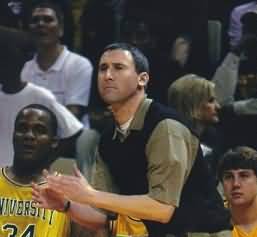Writing a Coaching Philosophy - by Ari Fisher
The Coach’s Clipboard Basketball PlaybookAri Fisher has coached on all levels except professionally. He started his career as the third assistant at LSU during the tenure of Dale Brown. He was on staff for four seasons; two as a GA and two as restricted earnings coach from 2003-06.
Coach Fisher was also the Head Boys' Basketball Coach and Associate Athletic Director at University Lab School from 1997-2008. His teams won Louisiana High School Class AA State Championships in 2002 and 2004. He was selected district coach of the year four times (1998, 2002 – 2004) and state coach of the year in 2004. His 2004 team finished ranked # 17 nationally.

Coach Ari Fisher
Afishe@lsu.edu or af2002004@gmail.com
The late Don Meyer was perhaps the most quotable coach in history of the profession. I incorporate his ideas within team coaching, individual training; even my 'Coaching of Basketball' and 'Psychology of Coaching' courses I have taught on the college level for two decades. His views about life, character, burnout, motivation, mental health, etc. are relevant for those serious about a rewarding and worthwhile career.
Two types of coaches exist; those wanting to be a coach, preparing through a physical education college curriculum and other faculty who mentioned in passing about enjoying basketball on TV, thus required to coach because an Athletic Director or Principal must fill a vacant spot.
A sizable majority of teachers within pedagogy work hard, respect the profession and kids with whom they educate, improve knowledge of subject matter and strategies for connecting information with current lives of students so they find it important, and help colleagues create or maintain a positive work environment. A select few distribute busy work or observe kids playing an indoor sport while reading a newspaper, eating snacks and drinking soda. Coaches representing the latter are satisfied with mediocracy due to having no philosophy or one that is vague, incoherent and replete with grammatical/spelling errors; seriously compromising his/her classroom and coaching performance.
One of my first memories attending Don Meyer's coaching academy in Nashville, Tennessee years ago was his beginning of the opening session. The first words were, "It does not matter where you coach, it matters why you coach", a message suggesting a coach must have a want to lead young people using precepts of competency, enthusiasm, and knowledge of sport rudiments/schemes.
New (often young) coaches are taught an importance of creating a functional coaching philosophy to demonstrate substance and seriousness for coaching. However, they elaborate about technical aspects: plays, practicing, drills, game situations, and ancillary ideas such as weight training. Including nothing about character, leadership, or a view of the purpose of athletics borders on inept. Coaches have a title, influence, and power first as teachers. Consequently, a philosophy is about teaching styles, ideas for imaginative team building strategies, how to successfully impact kids of varying ability levels, the role as a coach, defining the profession, and why they should be able to coach themselves. A cursory reference may be expressed about a team-specific issue or general philosophy of play (fast vs. slow; methodical vs. creative; intensity vs. relaxation).
A coach is initially defined by an ability to cogently describe their submitted philosophy for employment. Ideas do not have to be detailed, verbose, or exciting; but should convey how you view the profession, the type of model you wish to demonstrate to players (and all students), and hoped results of the experience participating in organized and official competitive sport. In an interview, an important period of time will be spent by the interviewer attempting to match verbal expression to a written philosophy submitted by the potential employee. Say what you mean and mean what you say. It shows confidence and a positive critically important first impression to superiors and players.